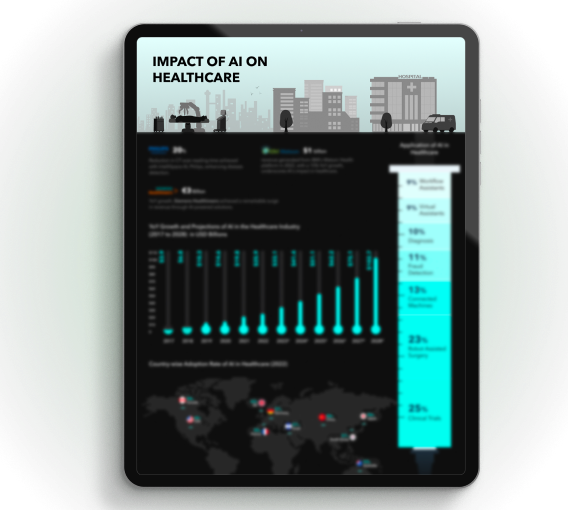- AI
- 12 min read
- August 2021
Digital Tech's Role in Healthcare Transformation
The healthcare industry has seen a dramatic progression in the past few years, particularly during COVID-19. Digital technologies are pushing healthcare transformation in the right direction. They have helped healthcare service providers build an excellent infrastructure by focusing on the patients' needs during these challenging times.
Digital health solutions are a blessing when healthcare organisations struggle to curb the spread of disease. Their outstanding performance and accessibility make patients and healthcare professionals comfortable using digital health services to resolve health issues.
The healthcare industry is not limited to only patients, doctors, and medical staff, it is a big picture that includes -
- Insurers
- Outsourcing healthcare service providers
- Healthcare businesses
Today, digital healthcare technologies like artificial intelligence, IoT, big data, cloud services, telemedicine, etc. transforms the working paradigm of this sector amid pandemic.
This results in enhancing the patient's interaction with the health professionals, securing data, insightful decisions, and helping companies provide better health solutions and positive outcomes.
The healthcare transformation market
From 2016 to 2020, the digital transformation in the healthcare market registered a CAGR of 10.4%. - Future Market Insights
The rise in the adoption of these advanced technologies across various applications within the healthcare industry is likely to drive the market over the coming years.
Moreover, digital healthcare has become a trending concept in developed countries like Germany, the US, UK, China, etc.
As a result, the global market for digital healthcare transformation is predicted to rise even better in the coming years, growing at an exceptional CAGR of over 14% through 2031.
So, let's look at the technologies that have had a massive impact in surging digitization in the healthcare sector post-pandemic.
Technology boom in the healthcare sector post-pandemic

1. The magic of artificial intelligence
Artificial intelligence in the healthcare sector is more than a trend. It is one of the cutting-edge technologies in which health businesses are ready to invest millions.
The global AI healthcare market has touched USD 4.9 billion in 2020, and it is expected to reach USD 45.2 billion by 2026 at a CAGR of 44.9%. This is tremendous.
The rising volume of healthcare data and the developing complexities of datasets are the two critical factors that drive the immense growth of AI in the healthcare market.
Chatbots and virtual health assistants are the best examples of AI-based technology with which patients are well-versed. From customer service representatives to diagnostic tools and even therapists, AI chatbots play a significant role in healthcare transformation.
Apart from patient care, the AI's potential is used in drug discoveries, genomics, precision medicine, and others.
From building balances between healthcare partners and collaborations to enhance the healthcare workforce productivity and better patient care, this technology is doing wonders in improving digital healthcare services.
2. Healthcare big data
Big data is another bleeding-edge trend in the healthcare sector that brings numerous benefits. Patient's health data or popularly known as EHR (electronic health record), is now strategically used to offer better patient care.
A big part of healthcare includes data management. Keeping patient data secure has always remained one of the critical concerns of the healthcare industry.
Big data in healthcare is a boon, it offers several benefits that help healthcare service providers keep their data secure and managed. It reduces medication errors by timely alarming the healthcare professionals and patients whenever there is a risk of mistakes in prescribed medicines.
Moreover, it facilitates preventive care; the big data analysis identifies the preventative plans and helps professionals in medical emergencies.
Big data predictive analysis is also helping hospitals and clinics predict future admissions, which streamlines the availability of the medical workforce in handling patients and enhances the hospital performance.
The global big data analytics in healthcare market size was valued at $16.87 billion in 2017 and is projected to reach $67.82 billion by 2025, growing at a CAGR of 19.1% from 2018 to 2025.
3. IoT in healthcare
Before introducing IoT, the interaction among patients and their health professionals was only limited to clinical visits or communications via text or calls. Doctors weren't left with many options to monitor their patient's health and provide necessary recommendations.
But IoT has remolded this practice and makes the concept of remote monitoring possible. It has enhanced the interaction of patients and doctors and boosted the patient's satisfaction rate. Moreover, it prevents hospitals from additional cost spending on devices, hospital amenities, and others and improves the treatment results.
IoT in healthcare benefits patients, doctors, families, hospitals, and even insurance companies. Today, several IoT applications are available in the healthcare industry that has changed people's lives significantly.
The global IoT in the healthcare market size was estimated at USD 180.2 billion in 2019 and is expected to reach USD 219.5 billion in 2020. Wearable devices are one of the best examples of IoT in healthcare that helps health professionals monitor their patients' health more effectively.
Moreover, the sensors incorporated in IoT devices allow hospitals to track their medical equipment like nebulizers, oxygen pumps, etc. Also, they can get the real-time location of their medical staff, which plays a massive role in emergency times.
4. The rise of cloud computing
Cloud computing technology has experienced a significant surge in the healthcare sector in the past few years. According to a recent market study, the market for healthcare cloud computing has reached USD 28.1 billion in 2020, and it is anticipated to reach USD 64.7 billion by 2025, at a CAGR of 18.1%.
The demand for cloud computing in healthcare is increasing as it helps healthcare organizations manage and store large amounts of data securely.
The healthcare sector often struggled in managing operational expenses, infrastructure costs, and smooth communication among the environment. The implementation of cloud technologies has unlocked several opportunities for healthcare organizations.
The use of the cloud allows them to increase their operational efficiency, streamlines the costs, and provides better patient care. The cloud infrastructure solutions assist health institutions in hassle-free data storage and access to true data interoperability.
Better collaboration, remote patient care, scalability, and other features have made this technology trendier and worthy in the healthcare sector.
5. Data analytics in healthcare
The need for quality and timely data has always been the priority of the healthcare sector, and the outbreak of COVID-19 has increased its necessity double-fold. In a rush to handle COVID-19, health organizations are rapidly moving to develop and implement data analytics in their business operations.
According to industry experts, machine learning and data analytics will play a significant role in understanding and tracking the spread of this disease and the actions applied in response to it.
AI and data analytics have featured on an excellent level in the line of defense against the COVID-19 outbreak. According to the market predictions- the global data analytics market size reached USD 132,903.8 million at a 28.9% CAGR from 2016 to 2026 (forecast period).
"The healthcare sector has seen a massive push in innovation during the pandemic and will continue to rise in the future years. Therefore, the health businesses are required to be updated with the latest trends and technologies."
Moving on, let's discuss in detail.
How is cloud computing transforming the healthcare sector post pandemic?
The worldwide digital health industry is expected to reach $456 billion by 2027 at a 17.5% CAGR - Research and Markets
Prompted by the increasing adoption of big data analytics, wearable devices, and IoT, the global healthcare cloud computing market is projected to reach $51.9 billion by 2024.
With the growing appreciation of the cloud, the technology and its applications will play an essential role in the future of the healthcare sector.
Currently, cloud computing is benefitting healthcare organizations and patients to a great extent. On the one hand, the healthcare businesses benefit from increased efficiency in services and reduce the additional operational expenses.
Moreover, cloud technology has made the management of healthcare records easier and safer than ever before. On the other side, the patients get fast healthcare services, resulting in better patient outcomes and engagement.
Cloud computing technology also automates backend operations and facilitates mobile health apps, these innovations continuously evolve and gain massive traction to cloud technologies.
Apart from healthcare organizations and patients, healthcare insurance companies are starting to harness the power of cloud-based data analytics to understand their customers better and run their own businesses efficiently.
"Cloud adoption rate in India has grown exceptionally as more organizations understand the cost and operational benefits of moving to the cloud, and this was further augmented during the lockdown period."
Benefits of cloud computing in healthcare transformation
So here are a few benefits that cloud computing offers to the healthcare system to smoothen the data sharing with guaranteed security.
- Managing the data servers
- Cost-effective tool to maintain and secure database
- It is specifically designed to handle large amounts of data
- Fast in speed makes the data uploading, sharing, and recovering process easy.
- Advanced security and protection which keeps medical and financial details highly safe
- Scalable
- Remote patient care
- Easy data updates using cloud
- Supports easy collaborations
- Access to telemedical practices enables sharing healthcare data, virtual consultation, and guidance through preventive, treatment, and recovery phases.
The most significant benefit that cloud computing offers to the healthcare sector is that it allows them to reach out to places where massive hospital infrastructure could be challenging. In addition, in-depth patient data and big data analytics have started making an enormous difference to medical research.
Driven by new health and safety protocols all across the globe, healthcare service providers have to bank upon cloud computing and big data analytics if they have to address patient needs effectively.
Now let's discuss the importance of infrastructure modernization in the healthcare sector and its future predictions.
Infrastructure modernization in digital health industry
Investment in the infrastructure modernization of the IT health department has become the most significant need of the time. However, it was necessary even before the COVID-19, but now it has become a high priority for the healthcare sector. A year ago, the pandemic hit the world wholly and drastically changed the world. It has forced organizations to adopt modernization and enable high-quality health services.
Whether you have planned to add new mobile health applications for clinics or hire a new workforce, including physicians or nurses, a weak healthcare IT infrastructure will have a massive impact. It affects your business's long-term goals and stops you from unlocking the potential demands like telehealth.
What benefits does a robust infrastructure provide to the healthcare industry?
Infrastructure modernization in the healthcare sector help health organizations in many ways :
- Reduces long-term operational costs
- Enables higher quality healthcare
- Increases reliability
- Increases IT workforce satisfaction
- Drives operational excellence
- Improves patient care and outcomes
- Scale with the present and future
- Augments security and trust among customers
With a modernized infrastructure, the efficiency of the IT healthcare Infrastructure and systems leads to lesser incidents of maintenance and troubleshooting which result in cost savings.
The updated infrastructure also enables cloud and automation of redundant processes, reducing employee cost and effort spent on mundane tasks. The result is a significant addition to the organization's bottom line while also enhancing the productivity of the IT teams.
Infrastructure modernization is a transformational change. It is not a standalone IT project. To enjoy the benefits mentioned above, the entire health organization must align and support the exercise to make it a success.
Last but not least, let's take a look at the use cases of these trending technologies that make you understand their importance and how they transform the healthcare sector in the future years.
Use cases of trending healthcare transformation technologies
1. Use case of AI in healthcare
AI has wholly revamped our lives with its excellent applications. Right from indulging in voice assistants like Siri, Google, Alexa to large-scale applications for supply chain, retail, manufacturing, autonomous cars, etc., it has spread its magic almost everywhere.
Apart from its magnificent performance in other industries, it marks a great impression in the healthcare sector that increases the productivity of the healthcare businesses, insurers and improves patient care.
If we talk about AI in healthcare, this technology is doing wonders in the current medical environment. The big market giants like Google, Microsoft, Amazon, Apple, and more have made tremendous AI-based applications for helping medical institutions globally. Today AI in healthcare is used for
- Virtual Assistance
- Healthcare bots
- Research and advanced analytics
- Diagnostics assistance and medical imaging
- Drug creation
- Patient Data Analytics
- Personalized medications and care
- Cybersecurity
- Fraud detection
- Surgical robots
- Healthcare system analysis
- Life coaching for personal health
2. Use case of cloud computing in healthcare
Cloud computing in healthcare increases the efficiency of organizations while eliminating their operational costs. It makes the sharing of medical records and financial data highly secure and seamless.
Moreover, it automates the backend operations that help the healthcare workforce to focus on better patient care. Cloud computing also smoothen the development and maintenance of telehealth apps, which plays a massive role in the current times of COVID-19.
Today, cloud computing in healthcare is used for
- Real-Time clinical data
- Healthcare IT services
- Data protection
- Automated operations
- Enhancing Workforce productivity
- Practice Management and EHR Software
- Analytics
3. Use case of IoT in healthcare
The benefits of IoT in healthcare are not limited to health organizations; it benefits patients, physicians, families, and insurance companies significantly.
IoT devices are changing the healthcare experience by making health services available on time. Currently, the IoT in healthcare is used as-
- Remote healthcare and monitoring
- Monitor health device
- Better management of clinical infrastructure
- Wearable biosensors
- Virtual hospitals and wards
- Connected inhalers
- Smartwatch monitoring
- Automated Insulin delivery systems
- Better drug management
- Fitness trackers
These use cases are just the inception of these cutting-edge technologies in the healthcare sector. The future of these technologies is prosperous. It will be exciting to see how these emerging techs set new benchmarks in healthcare operations and make this industry more potent.
Do you need help with your healthcare transformation initiatives?
The digital transformation in healthcare 2021 looks quite promising. The ultimate goal of any healthcare transformation is to provide better patient care and enhance business productivity. And here, technology can help you to achieve your business targets quickly.
Rapidops is a leading digital product development company with excellent digital health transformation experience with the latest technologies, making your business more productive and result-driven. We hold robust experience in healthcare app development.
We have worked with several healthcare organizations and helped them with cutting-edge digital actions that enhance patient outcomes and boost quality care.
So, what are you waiting for? Feel free to get in touch with us. Discuss your requirements today with us and get the best digital health solutions for your business.
What’s Inside
- The healthcare transformation market
- Technology boom in the healthcare sector post-pandemic
- How is cloud computing transforming the healthcare sector post pandemic?
- Infrastructure modernization in digital health industry
- Use cases of trending healthcare transformation technologies
- Do you need help with your healthcare transformation initiatives?





